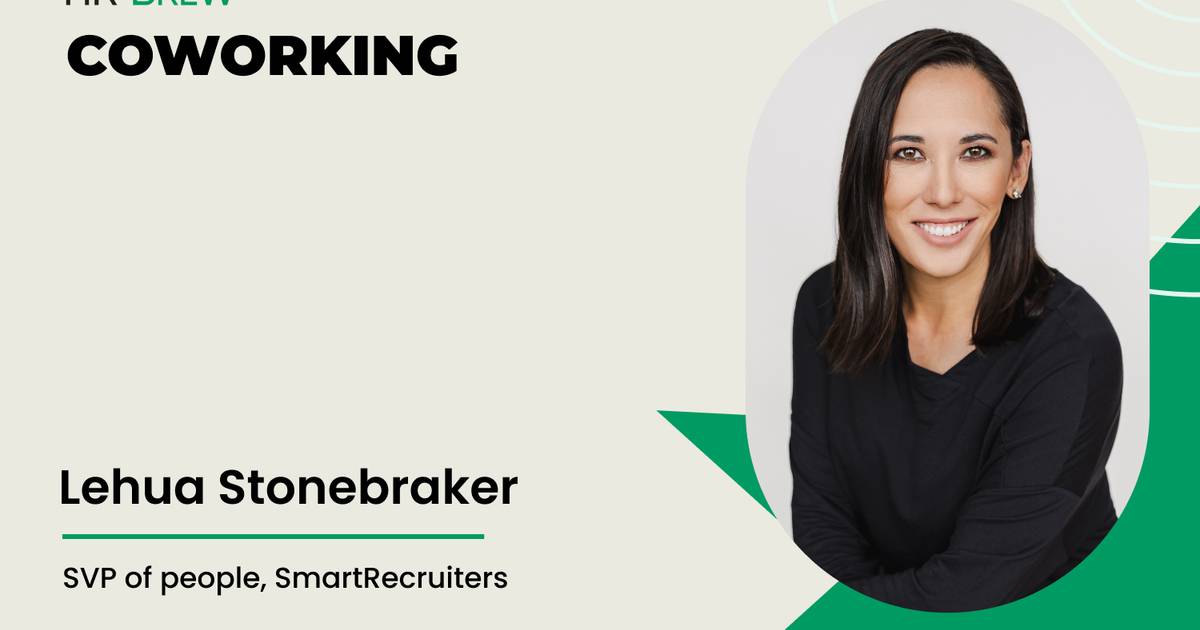
Here’s this week’s edition of our Coworking series. Each week, we chat 1:1 with an HR Brew reader. Want to be featured in an upcoming edition? Click here to introduce yourself.
Lehua Stonebraker worked in HR and recruiting at Gallup, TD Ameritrade, and Ceridian (now Dayforce) before finding herself now at SmartRecruiters, a global hiring platform. Stonebraker said, with her background in both HR and recruiting, that SmartRecruiters is “probably the best place to be,” because her executive leadership and board already speak the language of HR, and her HR team “get to be betas and really test out things” before a feature heads to market.
The HR leader oversees a global workforce of roughly 500 employees, and for the last 18 months her team has been building out a “foundation” for HR processes at the TA tech company.
“What that’s allowed us to do is propel to this next level where now we’re starting to create more enablement and empowerment across not only our managers, but our employees,” she said.
This interview has been edited for length and clarity.
What’s the best change you’ve made at work?
This past year at SmartRecruiters, we launched our inaugural employee board. We selected a diverse mix of individual contributors and managers from various departments and locations to serve as the direct voice of our employees, linking them directly with the executive leadership team. While our continuous listening strategy, including biannual surveys and pulse eNPS, provides valuable insights, it has its limitations. To bridge this gap, our employee board has excelled in hosting inclusive listening sessions. These sessions offer a safe space for employees to express their feelings, highlight areas of concern, and share impactful ideas. The board collects this feedback and has successfully recommended organizational programs, backed by senior leadership, to address these insights.
What’s the biggest misconception people might have about your job?
One common misconception is the job predominantly involves managing policies and procedures. However, it is a multifaceted responsibility that delves deeper into understanding and addressing the diverse needs and aspirations of individual employees. Balancing the intricate task of meeting employees where they are at in their career while also establishing standards of accountability and business expectations; all while being mindful of cultural norms and legal requirements.
Quick-to-read HR news & insights
From recruiting and retention to company culture and the latest in HR tech, HR Brew delivers up-to-date industry news and tips to help HR pros stay nimble in today’s fast-changing business environment.
What’s the most fulfilling aspect of your job?
The most fulfilling thing to witness is the tangible impact we have on individuals, which result in impact for the business. This year, we introduced a new internal mobility program with a goal to fill 20% of our open jobs with employees and we have filled over 30% YTD. And our people-first programs, like unlimited PTO, ability to work from anywhere, and mental health support, have made an impact on performance and productivity, which fuels our overall business success.
What trend in HR are you most optimistic about and why?
I see a lot of momentum around holistic employee well-being. It’s exciting to see programs go beyond traditional wellness and take a more comprehensive approach that considers mental health, work-life harmony, and personal development.
For the employee, programs like mental health support, flexible work arrangement, mindfulness programs, [or] project or experience-based development create an environment where employees feel valued and supported.
For the company, programs like these lead to a positive impact on productivity, employee retention, and overall engagement.
What trend in HR are you least optimistic about and why?
I am loving experimenting and learning all that generative AI can do, but am concerned about the overreliance on automated decision-making in HR processes. While technology streamlines many tasks and can enhance efficiency, an excessive dependence could lead to unintended biases or overlook crucial nuances in human interactions.
If not properly monitored or refined, they might prolong or even worsen existing biases, impacting hiring, promotions, or performance evaluations. Additionally, they might compromise a company’s culture by reducing human interaction and undermining the display of empathy in the workplace.










